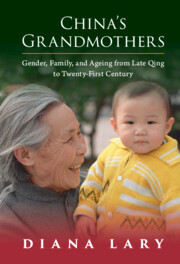Book contents
- China’s Grandmothers
- China’s Grandmothers
- Copyright page
- Dedication
- Contents
- Illustrations
- Tables
- Boxes
- Acknowledgements
- Preface
- Introduction
- 1 Precious Treasures
- 2 Archetypes and Images of Grandmothers
- 3 Baby Seekers/Baby Lovers
- 4 Child Care
- 5 Ruling the Roost
- 6 Old Age
- 7 Grandfathers
- 8 Transmitters of Culture
- 9 Absent Parents
- 10 Left-Behind Children
- 11 The Pleasures of Old Age
- 12 Leaving This Life
- 13 The Future of the Old
- 14 Personal Notes
- Afterword
- Notes
- Bibliography
- Index
Introduction
Published online by Cambridge University Press: 14 April 2022
- China’s Grandmothers
- China’s Grandmothers
- Copyright page
- Dedication
- Contents
- Illustrations
- Tables
- Boxes
- Acknowledgements
- Preface
- Introduction
- 1 Precious Treasures
- 2 Archetypes and Images of Grandmothers
- 3 Baby Seekers/Baby Lovers
- 4 Child Care
- 5 Ruling the Roost
- 6 Old Age
- 7 Grandfathers
- 8 Transmitters of Culture
- 9 Absent Parents
- 10 Left-Behind Children
- 11 The Pleasures of Old Age
- 12 Leaving This Life
- 13 The Future of the Old
- 14 Personal Notes
- Afterword
- Notes
- Bibliography
- Index
Summary
The mutual love between grandmothers and grandchildren has been a strong bond at the heart of Chinese families. As grandmothers – which almost all women were – women came in to their own in their families. Fortunate ones became great-grandmothers, fulfilling the traditional ideal of ‘four generations under one roof’.
Grandmothers were the beneficiaries of Confucian respect for old age. This respect faltered in the Mao Era (1949–1976) but has been reinstated in the Reform Era (1980–present). Respect implies material support; China has limited pensions and health care is expensive. Many elderly people rely on their children for support, support required by law.
China–foreign comparisons are inevitable, and often welcomed by the Chinese state, which takes pride in Confucian values. Chinese grandmothers do more for their families than Western ones. Chinese parents put greater trust in the abilities of their own mothers in child care. The elderly in the West do not expect to be supported by their children. Beyond the differences, the love of grandmothers for their grandchildren is universal.
- Type
- Chapter
- Information
- China's GrandmothersGender, Family, and Ageing from Late Qing to Twenty-First Century, pp. 1 - 12Publisher: Cambridge University PressPrint publication year: 2022



